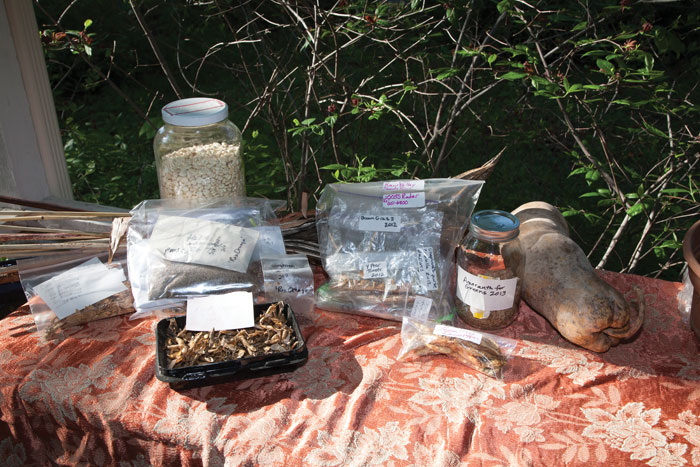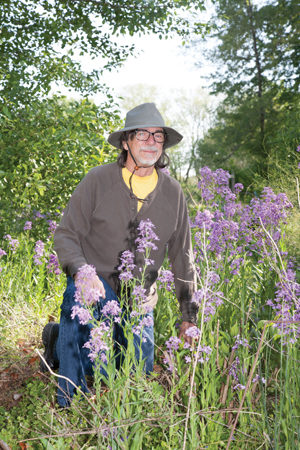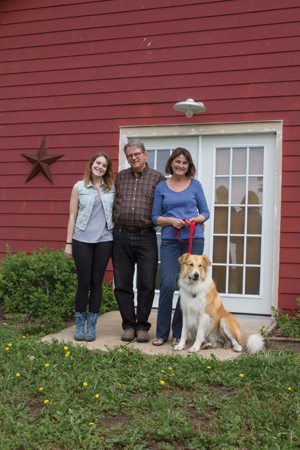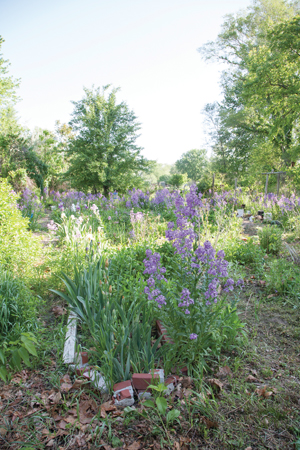| 2014 Q2 | story by EMILY MULLIGAN | photos by STEVEN HERTZOG |

When Dan Nagengast and Lynn Byczynski started their company, like any other new business owner, they needed seed money. Unlike other entrepreneurs, though, their seed money was actually being used to purchase seeds – a whole company’s worth.
These aren’t just any seeds, though, because they come all the way to Douglas County from northern Italy (after first passing through Homeland Security and then the USDA). Former organic farmers Nagengast and Byczynski bought their company, Seeds from Italy, about three years ago. They are the national distributor for the Franchi Sementi brand of seeds through their website and seed rack displays in stores from the Rockies to Ohio. And the whole business is run from their southern Douglas County home.
Their customers include home gardeners, large-scale organic farmers and smaller farmers who sell at farmers markets and to restaurants. Franchi, a family-owned company based in Bergamot, Italy, since 1783, provides seeds for fruits, vegetables, herbs and flowers – many of which are hard-to-find varieties or produce that is unique to Italian or European cuisine.
“Everybody always says, ‘They’re Italian, will they grow in the United States?’ People don’t realize almost all seeds are grown outside the United States. And Italy has almost as much climactic variation as the U.S. Plus GMOs are banned in the European Union – that is a big issue for most of our customers,” Byczynski said.
Nagengast and Byczynski do not run a retail store from their home, but they maintain a Franchi seed rack at Cottin’s Hardware in Lawrence. Their basement has transformed into a distribution center, with racks of the seeds lining the walls, rows of shelves filled with boxes and a mailing and packaging center for the orders. Between the retail racks and the website orders, business is going well.

KVSP leader Dan Bentley
“Whatever the opposite of saturated is, that is what our market is right now,” Nagengast said.
Nagengast says that many local farmers and growers plant the seeds, so it is helpful to see how the seeds grow in soil and climate here and where the products end up, from CSAs to restaurants.
“This business has a lot going for it, with cutting-edge culinary things right now, including eating more heirlooms and more fresh produce. There is a movement toward eating more greens for health, as well,” Nagengast said.
They found out about the company through Byczynski’s work as the publisher of Growing for Market magazine, which she has done for 23 years. The seed company’s previous owner, who lives in Massachusetts, advertised in the magazine and contacted Byczynski when he was thinking about selling the company. She and Nagengast, who is the former director of the Kansas Rural Center, were running Wild Onion Farm, but Nagengast had a hip injury and could no longer farm. They knew the opportunity could work well for them.
“It is the perfect business for us, because it fits in with what we have known and practiced for 25 years as organic gardeners. I’ve always been self-employed, so for us it doesn’t feel that different from what we’ve always done,” Byczynski said.
They worked with the Small Business Development Center in the spring of 2011 and put together a cash-flow model. Before the purchase of the company was finalized, they went to Italy to meet the Franchi family and see the business firsthand. The purchase was finalized in July 2011.
“It was an incredibly steep learning curve, but I’m past it now. I had two years of learning to think in Italian, the metric system and Euros, all at the same time,” Nagengast said.
In late summer each year, Nagengast tallies an “enormous work order” for Franchi of the seeds he would like to order for the coming growing season. He usually receives the shipment between Thanksgiving and Christmas. His peak work season is between December and May, when he fulfills orders from growers nationwide and establishes and refreshes the seed racks in stores. A few times during the year, he receives additional shipments as farmers request them, as well.

Laurel, Dan Nagengast, Lynn Byczynski & Angus
Because of a reciprocity agreement with the European Union, the seeds are inspected in Italy before they are packaged and sent to the U.S. All seeds are organic, except for garlic and fava beans, which must be fumigated in Miami before they can be sold in the U.S.
“We’re probably one of the few places you can get European garlics, because we go through the rigmarole,” Nagengast said.
Seeds from Italy sells seeds from a few other small Italian seed companies in addition to Franchi, and Nagengast also sells items such as Italian soaps and garden gloves. The other businesses he works with are family-owned like Franchi – something that is important to his Italian-American customers.
“I talk to Italians all day long, and they say their great- grandfather brought something over to the U.S., but they lost it. And we usually have what they are looking for,” he said.
Nagengast said that the U.S. Postal Service was his main partner in the business – he estimates that he ships 10,000 packages per year all over the United States, so it’s no surprise that he knows his letter carrier by name.
Kansas Seeds
What Seeds from Italy is to Italian seeds, the Kaw Valley Seeds Project (KVSP) is to northeast Kansas seeds – preserving the heritage of a particular region’s agriculture and culture through seeds.
A project of the Kansas Area Watershed Council, the KVSP maintains a reserve and provenance of flower and produce seeds that have been grown in northeast Kansas for years,some even for generations. The mission of the KVSP is to “create a local living seed reserve by fostering a network of people committed to growing, eating, sharing and bartering, buying and selling primary seed varieties of the Kansas River valley.”
Through its annual Seed Fair in February, the KVSP seeks to have a meaningful exchange of seed varieties that have stood the test of time in local climate and soils. No hybrid or genetically modified seeds are accepted, and the seeds must be grown with organic methods or practices.
“We want to be tracking – are these locally adapted seeds better for our area, or do we need to be looking at something else?” said KVSP leader Dan Bentley. “Our founding fathers were looking at what they were doing. We should all be doing that. What does well in what kind of soil and what we’re doing to the soil?”

Bentley said that the seeds allow for a way to track global climate change, which he has taken to calling “climate chaos” so that it loses its political implications. He said that local growers are feeling the effects of the “climate chaos,” so the dialogue and exchange about seeds is more important than ever.
The KVSP reserve also seeks to preserve the provenance, or history, of the seeds it contains. Some seeds were brought from abroad in previous generations; others have been grown
in the area since the contributors’ grandparents or great- grandparents time.
Bentley said the KVSP was born from the Central Prairie Seed Exchange, which dates back to 1981. Although most members of that group have passed away, the idea and purpose of the organization has morphed into the KVSP and comes to life each February at the Seed Fair.
Anyone can submit seeds to the reserve. The KVSP requires detailed records about the species and its growth characteristics, which are maintained with the seeds. KVSP members and the general public may obtain seeds to grow, but the Project requests that the grower harvest seeds at the end of the season and return them to the reserve to continue it for future generations.


7 Comments
You’ve made some really good points there. I checked on the net for
more information about the issue and found most
people will go along with your views on this site.
My webpage … vpn special code
Wonderful post! We are linking to this particularly great
article on our site. Keep up the great writing.
Here is my blog :: vpn special code
Outstanding quest there. What happened after? Thanks!
my web-site; vpn special coupon
Greetings! Very useful advice in this particular article!
It’s the little changes which will make the greatest changes.
Thanks a lot for sharing!
Hello it’s me, I am also visiting this web page daily, this website is actually pleasant and the
users are truly sharing pleasant thoughts.
I am now not sure where you’re getting your info,
however great topic. I must spend a while studying more or figuring out more.
Thanks for magnificent information I was in search of this information for
my mission.
Also visit my homepage; vpn coupon code 2024
What’s Happening i am new to this, I stumbled upon this I have found It absolutely helpful and it
has helped me out loads. I hope to contribute & help different
customers like its helped me. Good job.